五年级下册英语单元集体备课活动记录
- 格式:doc
- 大小:99.00 KB
- 文档页数:19
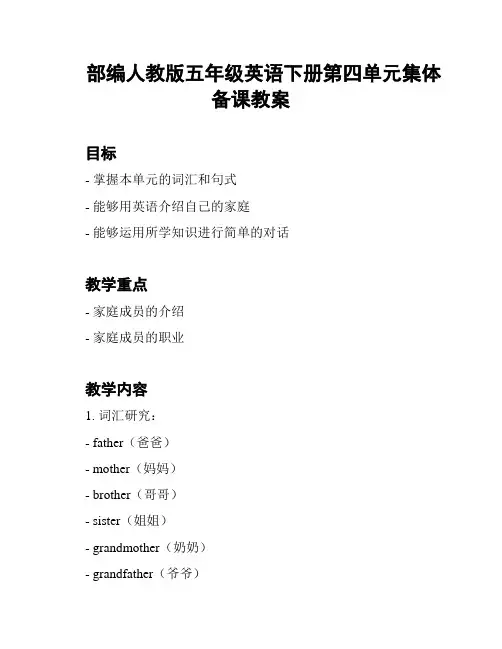
部编人教版五年级英语下册第四单元集体备课教案目标- 掌握本单元的词汇和句式- 能够用英语介绍自己的家庭- 能够运用所学知识进行简单的对话教学重点- 家庭成员的介绍- 家庭成员的职业教学内容1. 词汇研究:- father(爸爸)- mother(妈妈)- brother(哥哥)- sister(姐姐)- grandmother(奶奶)- grandfather(爷爷)- doctor(医生)- teacher(老师)- farmer(农民)- worker(工人)2. 句型研究:- This is my father.(这是我的爸爸。
)- What does your mother do?(你妈妈做什么工作?)- She is a doctor.(她是一名医生。
)- My brother is a teacher.(我的哥哥是一名老师。
)3. 对话练:- A: This is my sister. What does your father do?- B: He is a worker.4. 听力训练:- 听录音,判断图片和句子是否匹配。
5. 读写练:- 阅读短文,回答问题。
教学步骤1. 词汇研究:- 师生一同研究并拼读新词汇,学生可以通过图片和动作来记忆词汇的含义。
2. 句型研究:- 教师板书相关句型,并进行解释和示范。
学生跟读并进行实际练。
3. 对话练:- 学生自由搭配家庭成员的介绍,并进行对话练。
4. 听力训练:- 听录音,学生判断图片和句子是否匹配,进一步巩固词汇和句型。
5. 读写练:- 学生阅读一篇关于家庭的短文,回答相关问题。
扩展活动1. 角色扮演:- 学生分组进行角色扮演,模拟对话练。
2. 家庭介绍:- 学生可以用英语对自己的家庭进行介绍,并互相交流。
参考资料教材:部编人教版五年级英语下册。
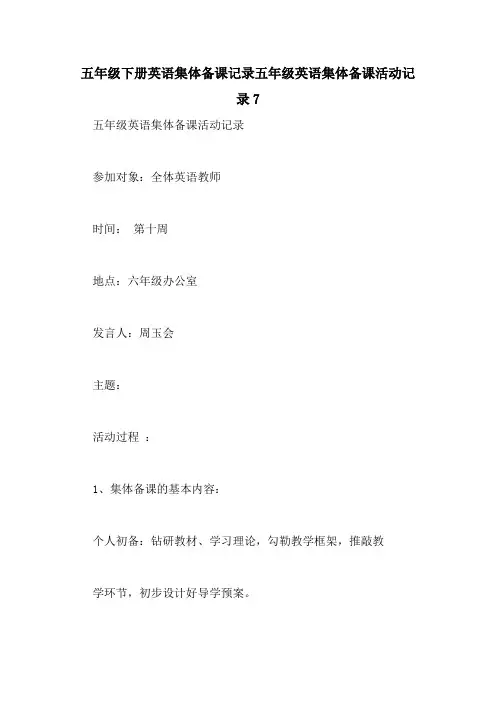
五年级下册英语集体备课记录五年级英语集体备课活动记
录7
五年级英语集体备课活动记录
参加对象:全体英语教师
时间:第十周
地点:六年级办公室
发言人:周玉会
主题:
活动过程:
1、集体备课的基本内容:
个人初备:钻研教材、学习理论,勾勒教学框架,推敲教
学环节,初步设计好导学预案。
共同备课:上周授课产生的问题展开研讨。
对下周的授课内容共同探讨。
个人细备:在集体研讨的基础上结合自己的教学风格及班级学生的特点相互借鉴合理取舍,形成有个性特点的教学设计。
2 ,在小组内对各种课型共同探讨;备课组长组织同学科教师对相关学科的各类课模式进行探讨,进而明确每种课型的教学内容和教学方法。
3、将课堂中的重点、难点、困惑点进行探讨,对典型题、易错点要逐一列举。
4、个人在集体研讨基础上形成有可行性、实效性的。
5、由周玉会老师执笔,认真做好活动记录。
内容仅供参考。
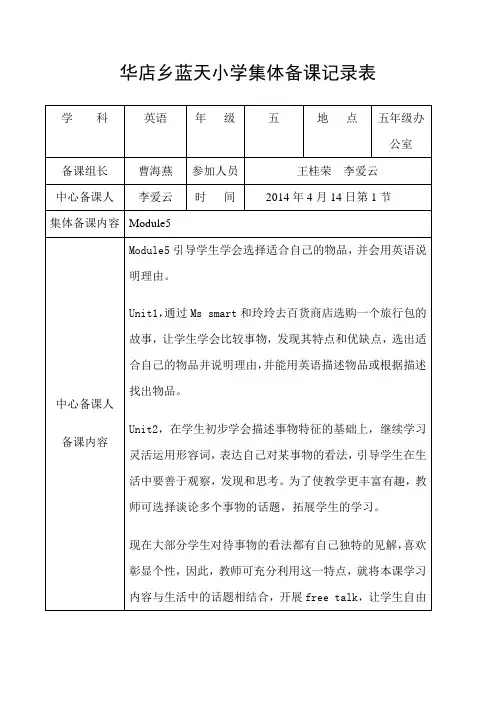
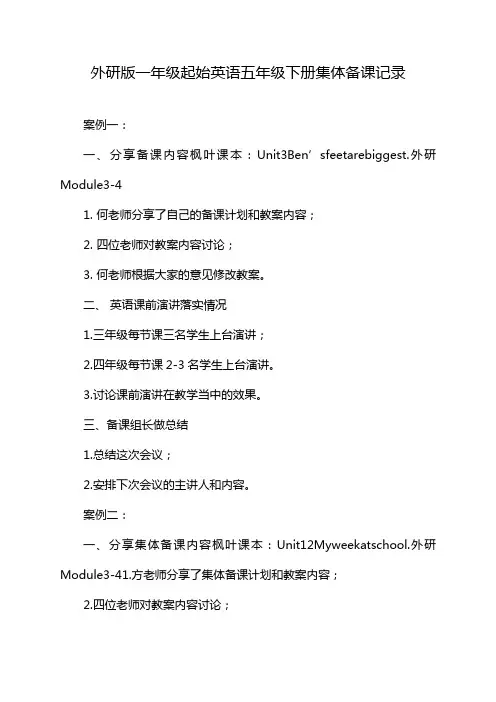
外研版一年级起始英语五年级下册集体备课记录
案例一:
一、分享备课内容枫叶课本:Unit3Ben’sfeetarebiggest.外研Module3-4
1. 何老师分享了自己的备课计划和教案内容;
2. 四位老师对教案内容讨论;
3. 何老师根据大家的意见修改教案。
二、英语课前演讲落实情况
1.三年级每节课三名学生上台演讲;
2.四年级每节课2-3名学生上台演讲。
3.讨论课前演讲在教学当中的效果。
三、备课组长做总结
1.总结这次会议;
2.安排下次会议的主讲人和内容。
案例二:
一、分享集体备课内容枫叶课本:Unit12Myweekatschool.外研Module3-41.方老师分享了集体备课计划和教案内容;
2.四位老师对教案内容讨论;
3.方老师根据大家的意见修改教案。
二、青年教师比武大赛的准备
1.三四年级定好课题(同课异构)
2.讨论使用的教学方法;
3.讨论AB班的教学方式。
三、备课组长做总结
1.总结这次会议;
2.安排下次会议的主讲人和内容。
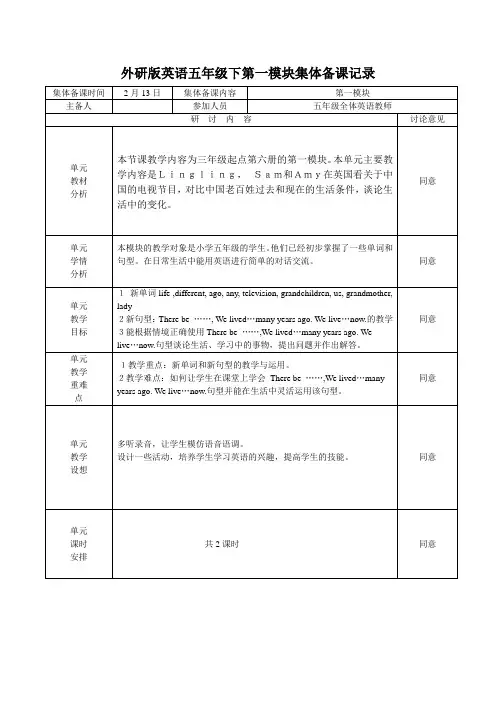
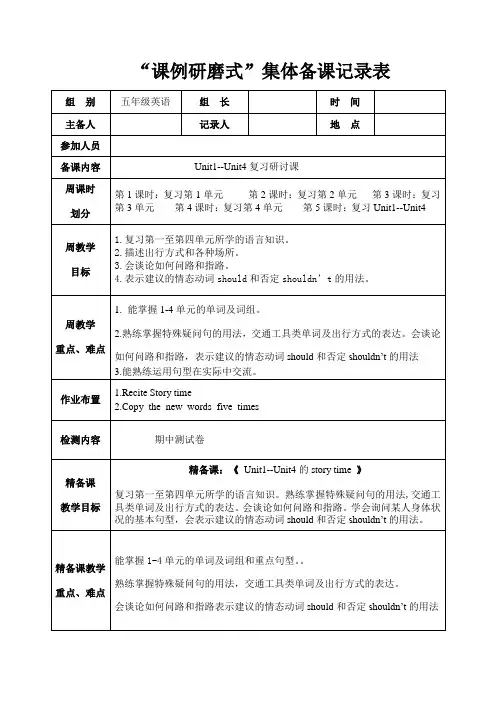
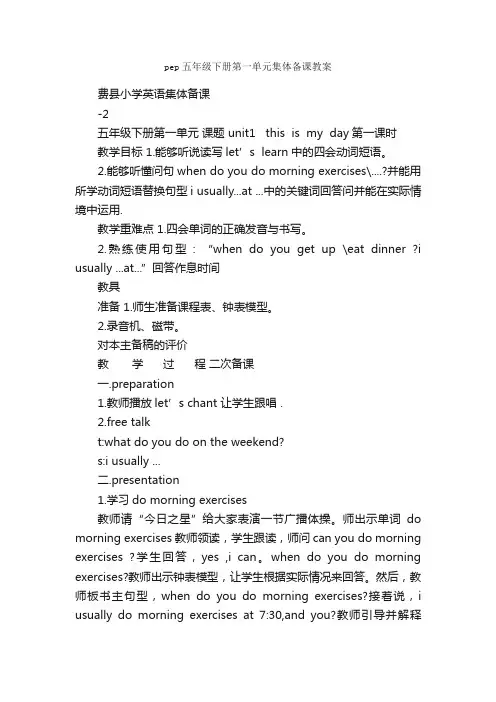
pep五年级下册第一单元集体备课教案费县小学英语集体备课-2五年级下册第一单元课题 unit1 this is my day第一课时教学目标 1.能够听说读写let’s learn中的四会动词短语。
2.能够听懂问句when do you do morning exercises\....?并能用所学动词短语替换句型i usually...at ...中的关键词回答问并能在实际情境中运用.教学重难点 1.四会单词的正确发音与书写。
2.熟练使用句型:“when do you get up \eat dinner ?i usually ...at...”回答作息时间教具准备 1.师生准备课程表、钟表模型。
2.录音机、磁带。
对本主备稿的评价教学过程二次备课一.preparation1.教师播放let’s chant 让学生跟唱 .2.free talkt:what do you do on the weekend?s:i usually ...二.presentation1.学习do morning exercises教师请“今日之星”给大家表演一节广播体操。
师出示单词do morning exercises教师领读,学生跟读,师问can you do morning exercises ?学生回答,yes ,i can。
when do you do morning exercises?教师出示钟表模型,让学生根据实际情况来回答。
然后,教师板书主句型,when do you do morning exercises?接着说,i usually do morning exercises at 7:30,and you?教师引导并解释usually和at。
2.学习play sports教师做动作,让学生猜一猜是干什么的。
然后说,yes ,i play sports every day you play sports every day ,too. 教师领读,学生跟读play sports,并让学生拼读单词。
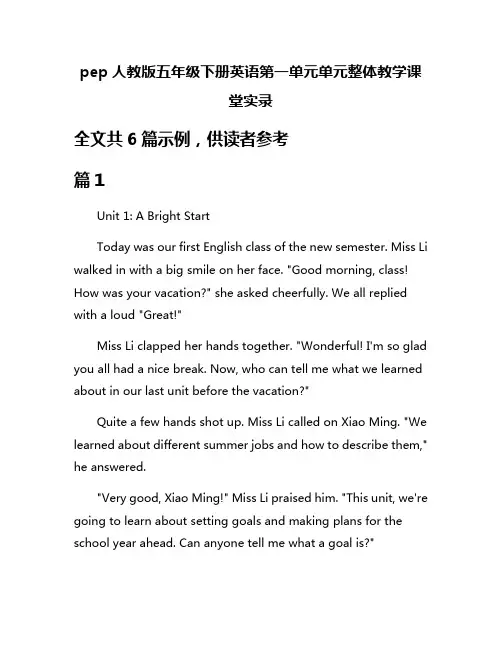
pep人教版五年级下册英语第一单元单元整体教学课堂实录全文共6篇示例,供读者参考篇1Unit 1: A Bright StartToday was our first English class of the new semester. Miss Li walked in with a big smile on her face. "Good morning, class! How was your vacation?" she asked cheerfully. We all replied with a loud "Great!"Miss Li clapped her hands together. "Wonderful! I'm so glad you all had a nice break. Now, who can tell me what we learned about in our last unit before the vacation?"Quite a few hands shot up. Miss Li called on Xiao Ming. "We learned about different summer jobs and how to describe them," he answered."Very good, Xiao Ming!" Miss Li praised him. "This unit, we're going to learn about setting goals and making plans for the school year ahead. Can anyone tell me what a goal is?"I raised my hand eagerly. Miss Li nodded at me. "A goal is something you want to achieve or accomplish," I explained."Excellent definition!" Miss Li said. "Setting goals is very important for success in life. Let's start with a fun activity - I want each of you to think of one goal you have for this school year. It can be anything - getting better grades, joining a club, or even something simple like reading more books."We all thought hard for a few minutes. Then Miss Li asked us to share our goals. There were all sorts of creative ones - Xiao Li wanted to win a writing contest, Xiao Zhang hoped to get on the football team, and Xiao Wang just wanted to be more organized with his homework.After we went around the class, Miss Li said, "Those are all wonderful goals! But how can we make sure we actually achieve them? The key is to make a plan with specific steps."She wrote an example on the board:Goal: Get an A in English classPlan:Pay attention in class and ask questionsDo all homework assignmentsReview material regularlyGet help from parents or teacher if struggling"Can you see how having a clear plan makes it much easier to work towards your goal?" Miss Li asked. We all nodded in agreement.Then it was our turn to make plans for our own goals. I decided my goal was to read 20 books this year, so my plan looked like:Read 30 minutes every night before bedBorrow books regularly from the libraryJoin the reading club at schoolAsk parents and teachers for book recommendationsOnce we had all written out our goals and plans, Miss Li had us get into small groups to discuss. "Share your goals with your group members, and see if they have any suggestions to improve your plans," she instructed.My group gave me some great ideas, like setting a reading timer on my desk and keeping a reading log. I also helped them refine their plans for joining sports teams and music clubs.As the class ended, Miss Li reminded us, "Don't forget to POST your goals and plans somewhere you'll see them every day! Staying motivated is so important. I'm excited to see what you all accomplish this year!"I could already tell this was going to be a productive semester. Having a clear goal and plan gave me a strong sense of purpose. I couldn't wait to start working towards becoming a reading superstar!篇2Hello Class! Today we are starting a new unit in our English textbooks – Unit 1: My Day. Miss Li seems really excited to teach us all about daily routines and schedules."Good morning students! I hope you all had a wonderful weekend," Miss Li begins with a big smile. "Who can tell me what the title of our new unit is?"I quickly raise my hand, eager to get started. "My Day!" I announce proudly when called on."Very good, Xiaoming. Does anyone know what this unit will be about?" Miss Li scans the classroom. Xuexue's hand shoots up."It's about our daily routines and schedules," she answers confidently."Excellent job, Xuexue! You're absolutely right," praises Miss Li. "In this unit, we'll learn vocabulary and phrases to talk about the activities we do each day, from when we wake up to when we go to bed at night."We all nod excitedly. Learning to describe our daily lives in English sounds really useful and fun!Miss Li continues, "Let's start by looking at the picture on page 12. What do you see?"I study the colorful illustration carefully. "I see a girl waking up and getting out of bed," I observe."Good eye, Xiaoming. And Fengfeng, what is she doing next?"Fengfeng points to the next picture. "She is brushing her teeth and getting ready for the day.""Wonderful! Then what happens after that, Dandan?" Miss Li gestures to the following images."Um, she eats breakfast...then leaves for school?" Dandan phrases it like a question, unsure.Miss Li smiles reassuringly. "You're on the right track. The pictures show her eating breakfast, packing her bag, and heading out the door to school. Very observant!"We spend the next few minutes reviewing the basic morning routine illustrated in the pictures, repeating the new vocabulary words like "wake up", "brush teeth", "eat breakfast", and so on. Miss Li has us all stand and act out the motions as we say each phrase.Next, Miss Li splits us into pairs to practice simple dialogues about our morning schedules using the new language from the pictures."Xiaoming, what time do you usually wake up?" Xuexue asks me.I scratch my chin, thinking. "I usually wake up at...7 o'clock in the morning.""Wow, that's early!" Xuexue responds. "I wake up at 7:30. Then what do you do after waking up?""Well, first I brush my teeth. Then I get dressed and eat breakfast - usually rice porridge with pickles!"Xuexue giggles at my breakfast choice. "I like toast with jam better. Do you have any other morning routines before leaving for school?"I nod enthusiastically. "Yes, I also pack my school bag and...oh! I almost forgot - I practice piano for 15 minutes too.""You're so diligent, Xiaoming!" Xuexue gives me a high-five. "I just watch cartoons until the last minute."We both laugh, then switch roles so I can ask Xuexue about her morning schedule. The practice dialogues are great writing and speaking practice.After letting us chat in pairs for a bit, Miss Li regains our attention. "Alright class, let's move on to talking about our afternoon schedules after school gets out. What kinds of activities do you all do in the afternoon and evening?"Handhands raise all around the room, everyone eager to share. "I do my homework!" "I have piano lessons." "I play basketball." "My grandma cooks dinner for us."Miss Li listens with a smile, nodding along. "Those all sound like wonderful afternoon activities. In this unit, we'll learn to talk about not just our morning routines, but everything we do until bedtime at night."The rest of class flies by as we review vocabulary for common after-school activities, meals, chores, hobbies, and how to describe our nightly routines too. We practice asking each other questions like "What do you do after dinner?" and "What time do you go to bed?". By the end, I feel like I've learned so many new English phrases to discuss my daily schedule!As the bell rings for class to be over, Miss Li reminds us, "Don't forget to review the vocabulary from today's lesson at home. Next class, we'll practice putting all the new morning, afternoon, and evening phrases together to describe a full day's routine. I'm excited to hear all about your daily lives in English! Class dismissed."I can't wait for the next lesson. Describing my typical day at school sounds really fun and useful. I'm glad we're starting this new unit!篇3Unit 1: My HobbiesTeacher: Good morning, class! How are you all doing today?Students: Good morning, Miss Lee!Teacher: Wonderful! Today, we're going to start a new unit called "My Hobbies." Can anyone tell me what a hobby is?Alice: A hobby is an activity that we do for fun in our free time.Teacher: Excellent, Alice! Hobbies are a great way to relax and enjoy ourselves after a long day of studying and working hard. Now, let's look at the first dialogue in our textbook.(The teacher plays the audio dialogue between two friends discussing their hobbies.)Teacher: Did you understand what they were talking about?Tom: Yes, Miss Lee. One of them likes playing badminton, and the other one likes reading comic books.Teacher: Very good, Tom. Playing badminton and reading comics are both hobbies that the characters enjoy. Can anyone give me an example of their own hobby?Mary: I like dancing! I take ballet classes every weekend.Teacher: That's wonderful, Mary. Dancing is a fantastic hobby that helps you stay active and express yourself creatively. Who else would like to share their hobby?(Several students raise their hands and share their hobbies, such as playing soccer, painting, and learning to play the guitar.)Teacher: It's great to see that you all have such diverse and interesting hobbies. Hobbies not only bring us joy and relaxation, but they can also teach us valuable skills and help us make new friends who share our interests.Now, let's practice some vocabulary related to hobbies. Can anyone tell me what "collection" means?John: A collection is a group of things that someone gathers and keeps, like stamps or coins.Teacher: Excellent, John! Collecting is a popular hobby for many people. And what about "craft"?Amy: A craft is an activity where you make things with your hands, like knitting or woodworking.Teacher: Well done, Amy. Crafts are a great way to express your creativity and make unique items.(The teacher continues to introduce and explain vocabulary related to hobbies, such as "masterpiece," "amateur," "professional," and "exhibition.")Teacher: Alright, class, now it's time for a fun activity. I've prepared a worksheet with pictures of different hobbies. In pairs, I want you to discuss the hobbies and write down the names and any vocabulary words you know related to each one.(The students work in pairs on the activity, discussing and writing about the different hobbies depicted in the pictures.)Teacher: Time's up! Let's share what you've written. Who would like to go first?(Several pairs of students take turns presenting their work and discussing the hobbies they identified.)Teacher: Great job, everyone! You've all shown a wonderful understanding of hobbies and the vocabulary we've learned today. For homework, I'd like you to write a short paragraph about your favorite hobby, using at least three new vocabulary words from this unit.Remember, hobbies are not only fun but also help us develop new skills and interests. I hope you all continue to explore and enjoy your hobbies outside of school.Class dismissed!Students: Thank you, Miss Lee!篇4Hi everyone! I'm so excited to share my experience from our recent English class. We started a brand new unit, and it was super fun! Let me tell you all about it.Miss Li, our English teacher, greeted us with her usual warm smile. "Good morning, class! Are you ready to embark on a new adventure?" We all nodded eagerly, curious to know what she had in store for us."Today, we're going to explore the first unit of our new textbook," she announced. "It's called 'My Favorite Things,' and we'll learn how to talk about our likes and dislikes, hobbies, and personal preferences."First up, Miss Li introduced some new vocabulary words. We learned words like "favorite," "hobby," "collection," and "interest." She showed us pictures and asked us to repeat the words after her. It was a fun way to learn!Then, we moved on to a dialogue between two characters, Amy and Tom. They were discussing their favorite things and hobbies. Miss Li played the audio, and we listened carefully."Amy loves playing the piano and collecting stickers," Tom said."That's cool! I like playing basketball and reading comics," Amy replied.After listening, Miss Li asked us questions to check our understanding. "What is Amy's favorite hobby?" she inquired. I raised my hand excitedly and answered, "Amy's favorite hobby is playing the piano!"Next, we practiced the dialogue in pairs. I partnered up with my best friend, Lily. We took turns playing the roles of Amy and Tom, pretending to talk about our favorite things. It was hilarious when Lily said her favorite hobby was eating ice cream!Miss Li then introduced a new grammar point: the present simple tense. We learned how to form sentences like "I like playing football" and "She doesn't like reading books." We did some exercises to practice using the present simple tense correctly.After the grammar lesson, it was time for a fun activity! Miss Li divided us into groups, and each group had to create a poster about their favorite things. My group chose to make a posterabout our favorite sports. We drew pictures, wrote captions, and even included some interesting facts.When we finished, each group presented their poster to the class. It was amazing to see the variety of interests and hobbies represented. From collecting rocks to playing video games, we all had unique favorites!Finally, Miss Li asked us to write a short paragraph about our favorite things. I wrote about my love for drawing and how I enjoy creating art with crayons and colored pencils. I even drew a little picture to go with my paragraph.As the class came to an end, Miss Li praised us for our hard work and enthusiasm. "You all did a fantastic job today!" she said. "I'm so proud of you for embracing this new unit with such energy and creativity."We couldn't wait for the next English lesson! Learning about our favorite things was not only fun but also helped us express ourselves better in English. I can't wait to see what other exciting adventures await us in this unit!篇5Teacher: Good morning, class! How was everyone's weekend?Students: Good morning, Mrs. Smith! My weekend was great, I went to the park with my family.Teacher: That's wonderful to hear! Today we're starting a new unit in our English textbook. Can anyone tell me what the unit is about from looking at the title and pictures?Student 1: I think it's about different countries and cultures around the world. I see pictures of famous landmarks like the Eiffel Tower and the Great Wall of China.Teacher: You're absolutely right, Sarah. This unit is called "A World of Wonders" and we'll be learning about diverse cultures, customs, and places. Let's start by looking at the first lesson - "Welcome to My Home Country." Who can read the first paragraph?Student 2: "Hello, my name is Miguel. I'm from a beautiful country called Mexico..."Teacher: Great job, Johnny. Mexico is indeed a fascinating country with rich history and traditions. The reading talks about some famous Mexican foods like tacos and enchiladas. Has anyone tried authentic Mexican cuisine before?Student 3: Yes, my family loves Mexican food! We sometimes go to this restaurant that serves the most delicious burritos and guacamole.Teacher: Wonderful, food is such an important part of culture. Now, let's look at some of the new vocabulary words we'll learn in this unit...(continues reviewing vocabulary)A few days later...Teacher: Okay, class, who can tell me what we learned about in yesterday's reading?Student 4: We read about the Day of the Dead festival that's celebrated in Mexico. It's when people honor their deceased family members with special altars and offerings.Teacher: That's right, Emma. The Day of the Dead is a very unique and meaningful tradition. Today, we'll watch a short video that shows how it is celebrated. Pay close attention...After the video...Teacher: What did you all think of that festival? Did anything surprise you?Student 5: I was surprised to see so many skeletons and skull decorations! In my culture, we don't really have celebrations involving things like that.Teacher: That's an excellent point, Jack. Different cultures have different perspectives and customs surrounding death and the afterlife. The skull imagery in Day of the Dead celebrations represents a light-hearted, positive view of death rather than something morbid or scary.We then spent some time discussing cultural perspectives and misconceptions. Towards the end...Teacher: Well, I'm impressed with how thoughtful and open-minded you all have been while learning about Mexican culture. Let's give ourselves a hand for being such great cultural ambassadors!Students:clappingTeacher: Next week, we'll explore some other fascinating countries and cultures by reading stories, watching videos, and even trying our hand at some traditional arts and crafts. I can't wait!Student 6: Me neither, Mrs. Smith! I'm really enjoying learning about different cultures in this fun new unit.篇6Today in English class, we started a new unit all about animals. Miss Li walked in carrying a big box full of stuffed animal toys. "Good morning, class! Can anyone guess what we'll be learning about this unit?" she asked with a smile.Xiaoming's hand shot up. "Animals?" he guessed."Very good, Xiaoming!" Miss Li praised him. She pulled out a fuzzy brown bear from the box. "This unit is called 'A World of Animals.' We're going to learn all about different kinds of animals and where they live."She reached back into the box and pulled out a plastic snake.A few girls squealed and laughed. "Don't worry, it's not real!" Miss Li assured us. "We'll start by learning how to describe an animal's appearance and characteristics."First, Miss Li had us open our textbooks to the vocabulary list on pages 4 and 5. There were words like "fur", "feathers", "scales", and "patterns." She held up each stuffed animal toy and we repeated the words that described what it looked like. Theelephant had gray wrinkly skin and big floppy ears. The zebra was black and white with stripes.Next, we listened to a recording about some kids visiting the zoo. They described seeing all the different animal exhibits. Miss Li paused the recording sometimes and asked us comprehension questions like "What did the girl say about the kangaroos?" It was a little tricky understanding everything at first, but I'm getting better at listening to English.After that, Miss Li put us into groups of four. Each group had to work together and make a poster about one particular animal. My group picked the panda! Lili looked up facts about pandas online while Dandan and I drew a big picture of a panda bear. We had to use the new vocabulary words to describe what pandas look like and what they can do. Dandan wrote "Pandas have black fur around their eyes and ears." I added "They have white fur on the rest of their body."When we presented our posters, Miss Li pointed out great examples of how we used descriptive language. Xiaoming's group did an awesome job on their poster about eagles. They wrote "Eagles have sharp curved beaks and sharp talons for gripping prey."Towards the end of class, Miss Li introduced some of the readings we'll do during this unit. One story is about a rainforest explorer who discovers a new species of frog. Another one takes place at a marine biology camp where the characters learn all about life in the ocean. I can't wait to read them!For homework tonight, we have to look over the vocabulary words again and write five sentences using them. We also have to fill out an activity sheet that has pictures of different animals, and we need to write what they look like underneath each picture.I feel like I already learned so much today! This is going to bea really interesting and fun unit. Studying different animals will make English class way more exciting than just learning grammar rules and vocabulary lists. I'm looking forward to learning more cool facts about animals and how to talk about them in English.。
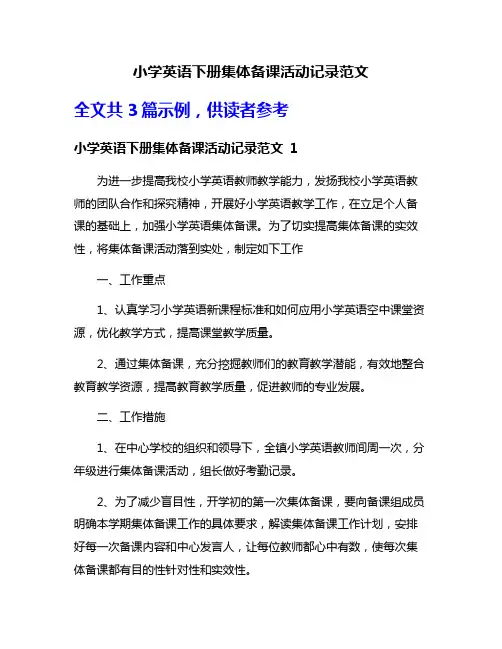
小学英语下册集体备课活动记录范文全文共3篇示例,供读者参考小学英语下册集体备课活动记录范文1为进一步提高我校小学英语教师教学能力,发扬我校小学英语教师的团队合作和探究精神,开展好小学英语教学工作,在立足个人备课的基础上,加强小学英语集体备课。
为了切实提高集体备课的实效性,将集体备课活动落到实处,制定如下工作一、工作重点1、认真学习小学英语新课程标准和如何应用小学英语空中课堂资源,优化教学方式,提高课堂教学质量。
2、通过集体备课,充分挖掘教师们的教育教学潜能,有效地整合教育教学资源,提高教育教学质量,促进教师的专业发展。
二、工作措施1、在中心学校的组织和领导下,全镇小学英语教师间周一次,分年级进行集体备课活动,组长做好考勤记录。
2、为了减少盲目性,开学初的第一次集体备课,要向备课组成员明确本学期集体备课工作的具体要求,解读集体备课工作计划,安排好每一次备课内容和中心发言人,让每位教师都心中有数,使每次集体备课都有目的性针对性和实效性。
3、每次集体备课,组内教师轮流做中心发言人,提前书写好自己要研究的教学设计和教学中的.困惑并在个人说明的基础上,全组成员进行交流讨论,最终拿出最佳教学方案。
4、组内教师要跟踪看课,反馈集体备课成果,做好听课笔记,并在下一次活动中加以改进。
三、具体实施措施1、严格执行“个人粗备-----集体齐备-----个人细备-----反思复备”的步骤。
备课依据:①三定:定集体备课课题,定中心发言人,定教学进度。
②四统一:统一单元教学目的,统一教学重难点,统一课时分配,统一单元评价测试。
③五备:备课标,备教材,备教学手段,备教法,备学法。
④五点:重点、难点、知识点、能力点、教育点。
2、备课组成员必须在集体备课前先行备好简案,以及在中心想好自己的设想。
3、中心发言人在集体备课前要深入钻研教材和大纲,反复阅读教学参考书及积极查找相关资料,为发言谈做好充分的准备。
中心发言人的辅导内容应包括以下内容:①教材简介:含教材内容、特点、教学目标、重点、难点、教具准备、课时安排等。

五年级英语备课组活动记录一、活动主题。
提高五年级英语课堂教学效率与学生综合语言运用能力。
二、活动时间。
[具体日期]三、活动地点。
学校会议室。
四、参与人员。
五年级英语备课组全体教师。
五、活动内容。
1. 教材分析。
- 主备教师首先对人教版五年级英语教材进行整体分析。
指出本册教材重点在于巩固一般现在时的用法,同时增加了一些复杂的词汇和句型结构。
例如,在Unit 3中,学生需要掌握描述日常活动的短语,像“do morning exercises”“have English class”等,并且能够用一般现在时的句型“He/She often...”来描述他人的日常活动。
- 大家共同讨论教材中的难点内容,认为对于一些语法概念,如第三人称单数动词的变化,学生理解起来可能会有困难。
像“go - goes”“do - does”的变化规则,需要通过大量的实例和练习让学生掌握。
2. 教学方法研讨。
- 一位教师分享了情景教学法在英语课堂中的应用。
以Unit 2 “My week”为例,可以创设学校课程安排的情景,让学生在真实的语境中学习有关星期和课程的词汇与句型。
在这个情景中,教师可以利用教室的课程表,让学生进行问答练习,如“What do you have on Monday?”“I have Chinese, English and music.”- 另一位教师提出采用游戏教学法来提高学生的学习兴趣。
比如在复习单词时,可以玩“单词接龙”游戏。
教师先说出一个单词,然后学生以前一个单词的最后一个字母为开头说出下一个单词。
这个游戏可以在小组内进行竞赛,激发学生的竞争意识,从而更积极地参与到单词学习中。
- 大家还讨论了如何在教学中运用多媒体资源。
例如,在教授有关自然景观的词汇时,可以播放一些美丽的自然风景视频,如山脉(mountains)、河流(rivers)等,让学生在观看视频的同时学习单词,增强视觉记忆效果。
3. 作业设计。
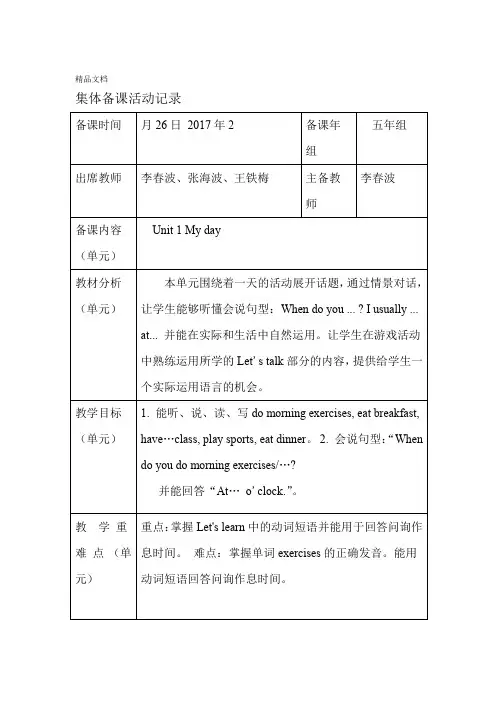
精品文档
集体备课活动记录
精品文档.精品文档
精品文档
精品文档.
精品文档
集体备课活动记录
精品文档
精品文档.精品文档
精品文档.精品文档
精品文档.
精品文档
集体备课活动记录
精品文档.精品文档
精品文档.
精品文档
精品文档.
精品文档
集体备课活动记录
精品文档.精品文档
精品文档.精品文档
精品文档.精品文档
精品文档.
精品文档
集体备课活动记录
精品文档.精品文档
精品文档.精品文档
精品文档.
精品文档
集体备课活动记录
精品文档.精品文档
精品文档.精品文档
精品文档.精品文档
精品文档.。
出席教内容(元)教材分析(元)教学目(元)五年级下册英语单元集体备课活动记录年2017年 2月 26日五年主教李春波、海波、王梅李春波Unit 1 My day本元着一天的活展开,通情景 ,学生能听懂会句型:When do you ... ? I usually ...at... 并能在和生活中自然运用 .学生在游活中熟运用所学的 Let’s talk 部分的内容 ,提供学生一个运用言的机会 .1. 能听、、、写do morning exercises, eat breakfast,have⋯class, play sports, eat dinner.2.会句型:“ When do you do morning exercises/⋯? 并能回答“ At ⋯ o’ clock.”.重点:掌握 Let ’s learn中的短并能用于回答教学作息.重点(元)点:掌握exercises的正确音 .能用短回答作息 .情境法、自学法、游法、合作学、任法教学方法等.个案研例内Section A Let ’s learnAsk and write容教材分本新授5个短,一天的活行答,析并要用所学短替句型“ I usually ⋯.at⋯”中的关回答句 .本是本学期的第一,所以要把重点放在吸引学生的趣以及注意力上 .着学生一,做一做 ,努力他从假期放松中回到学中来 .目11. 掌握 Let’s learn 中的短并能用于回答作息重点.2. 掌握 exercises的正确音 .1、身(1):What time is it now ? It’s ,,(2)复五年第一学期所学的一些 ,如:cook the meals ,wash clothes等.流2、新呈(1)游:Guess! What am I doing ? 引出新:程do morning exercise , have English class , eat breakfast ,eat dinner , play sport ?(2)利用 chant 学生行巩固What can you do ?I can do morning exercises . What can you do ? Ican ⋯⋯(3)在黑板上画一口 ,出 .教:I do morningexercises at 7:00 . What about you ?(4)学生根据自己的 ,所学的短行 .二次备课(单元反思)(5)教师在学生口述的时候,可以不失时机地加问:When do you ,, ?(6)介绍新单词:usually ,并运用到句子中: I usually ...(7)组织学生模仿Let’s learn进行对话 .3、Let’s play(1)学生二人一组配合表演动词短语,一人表演 ,艺人在他背后说出这个动作的名称,表演完毕后全班评选最佳拍档 .(2)学生再三人一组进行表演 ,第一人表演动作 ,第二人表演时间 ,第三人说出句子 ,如:I get up at 6:30,, Let’s chant教师播放学生用书第二页Let’s chant 的录音 ,学生听录音、跟唱歌谣 .教师请学生读单词sometimes , usually .Good to know : 教师帮助学生理解本部分内容.引导学生在句子中猜测单词before 的意思 .4、作业 .本课时侧重于对动作发生的时间的提问,所以在本课时中既有新的知识点 ,也有涉及上一学期所学知识的地方.教师在进行本课时的情景对话时, 尽量引导学生回顾上学期学过的动词词组 , 让学生穿插一些学过的动词词组在句型中进行练习,这样不仅让学生巩固了学过的动词词组 ,也使学生能够更加灵活地运用所学句型,真正运用到了生活情景中 .集体备课活动记录2017年 2月 26日年五年主教出席教李春波、海波、王梅李春波内容Unit 2 My favourite season(元)Which season do you like?/What's your favourite season?Why do you like summer/winter? Because I can... 是本元的重点句子 .点是 B 部分要求掌握的四会和教材分析,本元在内容上与四年下册第四元有相同(元)如 Cool, cold, rainy, windy, snowy, cloudy, sunny 等皆已出 ,因此教在教学程中注意以旧引新 ,以不同形式反复呈新知 ,从而降低学的度 .1、能力目( 1)能就所喜的季及原因行答,如: What'syour favourite season? Which season do you like best?summer/winter⋯⋯ Why do you like ⋯⋯? I can⋯⋯;教学目(2)能就天气情况行答 ,如: What is the weather(元)like in ⋯⋯?( 3)能听懂、会唱本元的歌曲 .2、知目(1)能 A、B 部分 Let' learn Read and write 中的和句子 ,并掌握其中的四会;(2)能 Read andwrite 掌握的四会句子 ,能懂内容 ,并完成理解教学重点(元);(3)能理解并开展 Let's start Make a survey Task time 等部分的内容;( 4)能了解 pronunciation 中字母合的音 ,能朗相关的例;(5)了解 Good to know Story time 等部分的内容 3、情感、策略、文化等有关目 .3、情感度:( 1)学生有趣用英表达 ,能极参与堂活;( 2)学策略:引学生注重小合作学,培养沟通和交流的能力;(3)文化目:学生了解有关全球天气差异的常 .重点:能自己最喜的季行答并述原因,主要句型是: Which seascn do you like best?/What's your favourite season? \Why do you like summer/winter?\ Because I can⋯点:系于本元句型的灵活运用What’s your favourite seson? Which season do you like best? Why do you like summer/⋯ Because I can...情境法、自学法、游法、合作学、任法教学方法等.个案研例内 A let’s learn容1、能听、、、写seaon spring summer fallwinter.教材分2、能使用句型: What’s your favourite season?提析并根据情况答 .3、了解四季天气植物特征 ; 能听懂会唱歌曲 What’ yourfavourite season?目1重点:能正确写五个名season spring fall winter 并运用句型 What is your favourte season?行答 ;重点点:四会season spring summer fall winter的正确写.引学生使用句型“ Which season do you like best? Ican ⋯⋯”答 .Step1 : 温故(用 5 分)1. 引学生复形容天气的 cold, warm, hot, cool.cold,cold— It ’s cold用同.方式复余下 .2.复四年下册天气的句型流T: What’sthe weather like in Kunming? Ss: It ’s cold/⋯程Step 2. 新内容展示(用19 分)1) Learn the new words: season, spring, summer,autumn, winter.2) T: spring, spring, I like spring.Ss: spring, spring,I like spring.3) Talk about the weather.4) Let’ s learn.T: Which season do you like best?S1: Spring. It’ s warm andeverysunnyday.二次(单元反思)S2:Summer.I can go swimming⋯反复操并学生掌握句型.5)、Listen to the tape,分角色 Let ’s learn. 学生翻句子 .Step 3. 合作交流 ,生共建(用 8 分)1、Role- play:2 、 Read and match: Read and choose the right pictures.Step 4. 达(用7 分)学生小Step 5.布置当堂作背并默写四会及句型.本的知内容相而言度不大 ,而且与我的生活也很密 ,教要注意引学生多运用 ,多想,将四季的画面与我生活所系起来;在日常生活中 ,学生多用英来表达和交流 ,巩固所学知 ,真正做到学以致用 .解决点也使本的一大亮点,通而又巧妙的游置 ,学生可以再争中不断重复新学 ,并且在思考四季的描述,深化了理解 ,可7/21集体备课活动记录备课年备课时间2017年 2月 26日五年组组主备教出席教师李春波、张海波、王铁梅李春波师备课内容Unit 3 My school calendar(单元)本单元主题为“ My school calendar”,根据五年级学习心理认知能力特点 ,教师在教学设计中要充分体现教材分析出课时目标明确 ,教学过程循序渐进 ,强化学生听说能(单元)力,侧重学生语言学习习惯和读写能力的养成的教学特点.1.能力目标:( 1)能够初步感知一般将来时的语法结构,并能够在真实的语言情境中运用 will 引导的特殊疑问句来询问将要发生的计划与打算 .(2)能在图片 ,手势 ,情景等提示的帮助下 ,听懂录音材料 ,并尝试复述课文 . 2.知教学目标识目标:( 1)能够掌握 A、B 部分 Let’s Learn 中的四(单元)会单词 .(2)能够听、说、认读 A 、B 部分 Let’s talk 中的单词和句型 .(3)能够掌握 B 部分 Read and write中四会句型,并能灵活运用 .(4)能够了解字母组合ch,sh的发音规律并能读出例词 .(5 了解 Story time 等部分的内容 .本元的重点内容是掌握四会短及句型;掌教学握一般将来的述句与特殊疑句法构 . 点内重点(元)容是使学生能掌握四会与三会,并能在践中灵教学方法例内容教材分析目重点活地运用本元的短和句型.情境法、自学法、游法、合作学、任法等.个案研Period 1 Section A Let’s learn \let’s do1. 能听、、、写表示月份: January, February,March, April, May. June.2.初步了解各个月份中的一些日的英表达方式 .3.学生能出自己最喜的月份(1---6 月) .1重点: January, February, March, April, May. June的.学 .点: When is your birthday? / When is Tree Planting Day?It ’s in 的⋯学.. .流Step 1.温故 (用 5 分)1)Greetings: sing a song together.程2)Revision:Go over the old words: Monday,Tuesday ⋯⋯ Sunday.Step 2. 新内容展示(用18 分)1)板: the title“UnitMy3 school calendar并教” .2) Learn the new words:January, February, March, April,May. JuneT:January January spell it please. S:Read afterteacher and spell the word.T:Make a sentence: My birthday is in January. S:Readafter teacher(同的方法教其他)引学生自己出句子如: January January. My birthday is in January..(明确告知学生在只有月份的情况下只能用介 in).3)引学生自己出句子如: January January.My birthday is in January..(明确告知学生在只有月份的情况下只能用介in).4)引学生找出 1---6 月份中的日及自己能用英文出的名称 ,如: Children ’s Day等 .5) Listen to the tape (let’ s learn)Step 3.合作交流:(用8 分)1)小合作:2)两人交流:When is May Day?S:It ’s in May.⋯⋯⋯⋯ ..3)Finish“Read and say”.Step4、达(用8 分)Step5、布置当堂作完成 January, February, March, April, May. June 在四线三格上的写法 .二本课时的知识内容现相对而言难度不大,而且与我们的次生活实际也很紧密 ,教师要注意引导学生将所学内容与备我们生活所见联系起来;在日常生活中,让学生多用英课语来表达和交流 ,巩固所学知识 ,真正做到学以致用 .例(单元反如讨论校历安排等 .思)集体备课活动记录备课时间2017年3月7日备课年五年组组主备教出席教师李春波、张海波、王铁梅李春波师备课内容Unit 4 When is Easter?(单元)本单元的教学内容都是围绕谈论节日这个主题展开的 ,教材分析本节课主要是对话教学 .学生能够在图片和教师的帮助(单元)下,理解对话大意 ,能正确的语音、语调及意群朗读对话 ,并进行角色表演 .1、能够听、说、读、写核心句型: When is April Fool ’sDay? It ’s on April1st. When is your birthday? My教学目标birthday is on April4th.2、能够在情景中运用句型When is April Fool ’s Day? It’s on April 1st.询问并回答(单元)某节日的日期 ;能够在情景中运用句型 When is yourbirthday? My birthday is on April 4th. 询问并回答有关生日日期的内容 .3、能够按照正确的语音、语调、意群朗.4、能在片的帮助下理解日;能按照正确的音、、意群朗日,能运用核心句型完成写完整句的任 .重点:句型: When is your birthday? My birthday ison April 4th. What will you do for your mum? I’ll cook noodles for her. : cook noodles, both of 教学you . 点:学生能在境中理解生both of you重点的(元)意思 , 并能正确音 , 熟使用一般将来的用 . 在具体的境中 , 理解并使用下列句型:We can have abirthday party for both of you!教学方法情境法、自学法、游法、合作学、任法等 . 个案研例内 Period1 Section A Let ’ s learnAsk and answer 容本元与学生生活密系的“ 日和生日” 展开,并将延伸到日和生日所在的日期 . 上个元 ,学生已学了 12 个月份的以及一些日教材分及日所在的月份 .本将学有关日所在的具析体日期;学 1~5 的序数和日期表达法 .要求学生能掌握的句型 When is⋯? It’s on⋯并回答有关生日或日所在的日期 .1、听、、、写序数:first(1st), second(2nd),目third(3rd),fourth(4th), fifth(5th).2、初步了解各序数的用法及在句子中的法、写法.3.学生能出一些关于序数的律 .重点: first(1st), second(2nd), third(3rd), fourth(4th),重点fifth(5th). 的学 .sentences:When is the sports meet? It ’son April 4th..的学 .点:初步了解各序数的用法及在句子中的法、写法..Step 1.温故 (用 7 分)1)Greetings: sing a song together.2)Revision:Go over the old wordsStep 2. 新内容展示(用18 分)1)板:the title“UnitWhen4 is Easter?并”教.2) T: Do you know when Easter is? Ss: It usually’ in流April⋯⋯.T: DO you know when April Fool’s DaySs:is?4.1程T: Do you know how to say 4.1 in English?Learn the new words:first(1st), second(2nd),third(3rd), fourth(4th),fifth(5th)T:first .first Spell it please. S:Read after teacher andspell the word. (似方法教 )3) T: Make asentence: first .first April Fool’ s Day is on April 1st.S:Read after teacher(同的方法巩固其他, My birthday is on May 2nd.明确告知学生在月份的第几日要用序数,前面要加上定冠”the ”同,在某月某日前要用介on).4)生互序数、基数及短5) 句子操6)Listen to the tape and read after it.Step 3.合作交流:(用 5 分)Step4、达(用8 分)Step5、布置当堂作1.完成 first(1st),⋯, fifth(5th)在四三格上的写法.2.一句今天才学会最感趣的句子.二本的不足之在于,多 ,因而个的次不 ,不充分 ,基差的学生照不到.日期表达是点 ,因此在下需行巩固.(单元反思)集体备课活动记录备课年备课时间2017年 3月 14日五年组组主备教出席教师李春波、张海波、王铁梅李春波师备课内容Unit 5 Whose dog is it?(单元)本单元主要学习物主代词 ,并能够在情景中运用句型: Is he drinking water? No, he isn’t. He’s eating. 询问和回教材分析答某人正在做某事 .能够在图片的帮助下读懂韵文 ,并能(单元)正确地朗读;能够运用核心句型完成句子,描述动物正在做的动作 .要求老师运用多种教学手段帮助学生突破难点 .1、能够听、说、读、写句型:The yellow picture is mine.Are these all ours? Whose is this? It’s Zhang Peng’s. Is 教学目标he drinking water? No,he isn’t. He’s eating. 2、能够(单元)在情景中运用句型: The yellow picture is mine. Are theseall ours? Whose is this? It’s Zhang Peng’s.询问和回答某物属于某人.3、能在情景中运用句型:Is hedrinking water? No, he isn ’t. He’s eating. 和回答某人正在做某事 .重点:能听、、、写句型: The yellow picture is mine. Are these all ours? Whoseis this? It ’s ZhangPeng’s. Is he drinking water? No,he isn’t. He’教学重点s eating.(元)点:能在情景中运用句型:The yellow picture is mine. Are these all ours? Whoseis this? It ’s ZhangPeng’s. 和回答某物属于某人.教学方法情境法、自学法、游法、合作学、任法等.个案研例内容教材分析目Period 1 Section A Let's learn本元与学生生活密系的“ 日和生日” 展开,并将延伸到日和生日所在的日期 . 上个元 ,学生已学了 12 个月份的以及一些日及日所在的月份 .本将学有关日所在的具体日期;学 1~5 的序数和日期表达法 .要求学生能掌握的句型 When is⋯? It’s on⋯并回答有关生日或日所在的日期 .1. 掌握新 : his ,hers, theirs, ours, yours, mine .2. 掌握句型 : Whose dog is that ? It’s my dog. =The dogis mine.重点:能准确的出和写出新的.重点点:能理解和运用新、句子:Whose dog is it ? It’s your dog. /The dog is yours.Step1 : 预习温故(用时 6 分钟)1.Sing a song: When is your birthday? ( P71)2.T: Which season do you like best? S: Spring. T: When is April Fool’s Day?S: It’s on April 1st.T:When is your birthday, Mike? S1: My birthday is onAugust 5th.T:Whose birthday is in October? (教师板书这些句型,并强调划线部分 ) 流Step 2. 新课内容展示(用时18 分钟)Learn words : his, her, their, our, my ,your 程T:Read after me :his book, her pen, their dog , our cat,my 预book.S: his book, her pen, their dog, our cat, my book.设T: Do you have a pet?S: Yes. / No.3. T: Look! That is my book.The book is mine T: Whose book is that?S: It’ s Amy’ s book.T:The book is hers. (标有下划线的地方可替换其它单词)4.Listen to the tape and follow reading.Step 3. 合作交流 ,师生共建(用时 6 分钟)Step 4. 达标检测(用时 7 分钟)Step 5.布置当堂作(用 2 分 )1、学生正确的抄写:hers , theirs, ours, his, yours,mine.2、运用每个写出句子 .It’s their book. The book istheirs⋯二1、ng 和元音 a、o、i 等的引出怎么能更自然一些 ,部分次的理稍生硬 ,需要改 .2、字母拼的操能否增加趣味性 .有些活仍缺乏一定的趣味性.如何使操既有意又有趣味性我得学.3、上分配不是很合(单元反思)理.集体备课活动记录2017 年 4 月 11日年五年主教出席教李春波、海波、王梅李春波内容Unit 6 Work quietly!(元)本元主要学用在行的基本表达正在做什么事.在之前的学中 ,在行有一些零散的接触 ,教材分析在五年上册 Unit5 中初步学了在行的一般(元)疑句 ,并在本元第一中初步学了如何并回答某些人是否正在做某事 ,本将在此基上一步学如何并回答某些人是否正在做某事 .1、能听、、、写句型:What are they doing? They’ reeating lunch! What’s the little monkey doing? It ’s playingwith its mother.以及 Talk quietly. Keep your教学目desk clean. Take turns. Keep to the right. Work quietly. 、2(元)能在情景中运用句型 Talk quietly. Keep your desk clean.Take turns. Keep to the right. Work quietly.行范 .重点:能听、、、写句型:What are they doing?They’ re eating lunch! What’ s the little monkey 教学doing? It’s playing with its mother.重点(元)点:能听、、、写五个的在分:doing morning exercises,having ⋯ class,eatinglunch, reading a book, listening to music.教学方法情境法、自学法、游法、合作学、任法等.个案研例内Period 1 Section A Let's learn容重点学运用在行的五个短 ,并能运用句型“ What are you doing? I am ⋯..” 行答 , 教材分本要学的知点“ doing morningexercises, having⋯析class, eating lunch, reading a book, listening to music”等短 ,然后通条等游形式直地巩固些短 .1.掌握新和短:doing morning exercises, having ⋯class,eating lunch, reading a book, listening to目music.2. 掌握句型: What is Chen Jie /she /he doing?What are the students /they /you doing?1.能掌握新的单词和短语 .重难点2.能理解并运用新的句型 .Step1 : 预习温故(用时 5 分钟)1. T: When is your birthday? S: My birthday is onApril 8th.T: Whose storybook is that?S: It’s yours. T: Whose pen is that?S: It’s Sarah’s. /It’shers.T: Is he drinking water?S: Yes, he is.流T: Are these rabbits eating?S: No, they aren’t.2. Review unit5’ s content.程Step 2. 新课内容展示(用时15 分钟)1. T: Look at the picture .What’doing?sChen Jie预2.Sentences: T: What is Chen Jie / he /she doing?S:He / She is eating lunch 设T:What are the students / they/you doing?S:They /We are listening to music.Step 3. 合作交流 ,师生共建(用时 10分钟)1. Teacher sayEnglish, students say Chinese, And then exchange.2.Teacher shows word card, student say words.3.灵活运用本节课句型 :. S1: What is Zhang Pengdoing?S2: He is reading a book.S1: What are Sarah and Chen Jie doing? S2: They areeating lunch.Step 4. 达(用7 分)Step 5.布置当堂作(用 2 分 )1、抄写:having ⋯class, eating lunch, reading a book,listening to music⋯2、熟和短 .二本利用复旧知,学如何将知点运用在次中.同 ,本含有大量的合性情景交,教一定要予学生充足的行,帮助学生通行知点的整合 .(单元反思)。
五年级英语下册第四单元教案集体备课五年级英语下册第四单元教案集体备课五年级英语下册第四单元教案集体备Unit 4 hat are u ding ?一、教材分析:本单元重点学习现在进行时和有关打电话的一些交际用语。
现在进行时是学生初次接触的语法内容,老师可以创设有效的情景让学生理解它的意义,然后通过大量的语言训练让学生熟练的运用现在进行时。
主要句型是:hat are u ding? I’…… hat is he/she/it ding? He/She/It is……教师可以结合适当的体态语言引导学生感知、理解现在进行时所表达的含义。
前五册学生用书,特别是五年级上册第四单元已涉及到一些动词和动词短语,教师要充分利用已学过的内容为新知识的教学服务。
从已经学过的动词短语入手,通过比较动词原形和动词的ing 形式,让学生逐步理解并掌握现在进行时的用法打电话是现在社会人与人交流的主要形式之一,与学生生活联系密切,老师可以开展丰富的活动让学生在尽量真实的语境中去运用新知识。
二、学生情况分析:五年级学生,通过两年多的英语学习,他们已经掌握了一定的英语词汇及简单句型,能使用英语对熟悉的事物进行描述。
英语学习兴趣浓厚,模仿力强,好奇心强,喜欢表现自己。
三、教学目标:1 能力目标a 能够简单描述自己或他人正在做什么,如:I’ansering the phne She’s ing dinnerb 能够询问他人正在做什么,如:hat are u ding? hat is he/she ding?能够用简单的电话用语进行交际。
d 能够听懂、会唱歌曲“hat are u ding?”2 知识目标:a 掌握A、B部分Let’s learn、Read and rite 中的四会短语和句子。
b 能够听、说、认读A/、B部分Let’s tal 、Read and rite中的白体句子。
了解字母组合, u, tr, t的发音规律及其例词的读音。
PEP 小学英语五年级下第五单元集体备课内容五下五下Unit Five Look at the Monkeys 单位:黄羊学校单位:黄羊学校 主备人:赵主备人:赵 瑞 参加人:李参加人:李 敏 梁敏建梁敏建2011.5.13 单元教材分析:单元教材分析:1. 本单元的教学重点是有关动物正在做什么的英语表达,主要句型是:“What is she/it doing? She/It’s....What are they/the tigers …doing? They are....”they/the tigers …doing? They are....”, , 难点是A 、B 部分的Read and write 和Let’s learn 部分的十个动词ing 形式的四会掌握。
本单元的动物名称和要求掌握的动词在前五册学生用书中都已经出现过,教师要注意以旧引新,降低教学难度。
本册书第四单元的教学难点也是现在进行时,教师在教学时应注意联系第四单元,指导学生温故而知新。
教师在教学时应注意联系第四单元,指导学生温故而知新。
2. 五年级的学生对一些常见的动物的特征、习性都有一些了解。
如果条件允许,教师在引导学生准确运用现在进行时进行英语表述的基础上,可以结合他们已有的知识丰富对话内容,增加课堂语言的信息量。
另外,本单元要求四会掌握的单词、短语和句型都有一定的难度,教师必须及时进行巩固操练,争取达到满意的教学效果。
固操练,争取达到满意的教学效果。
单元教学目标:单元教学目标:1. 能力目标:能力目标:1) 能够询问动物正在做什么并作答,如;What is it doing? It’s eating bananas. What is the mother kangaroo doing? She’s jumping. What are the tigers doing? They are swimming kangaroo doing? She’s jumping. What are the tigers doing? They are swimming. .2) 能够听懂、会唱歌曲:Animals, Animals Are Everywhere 。